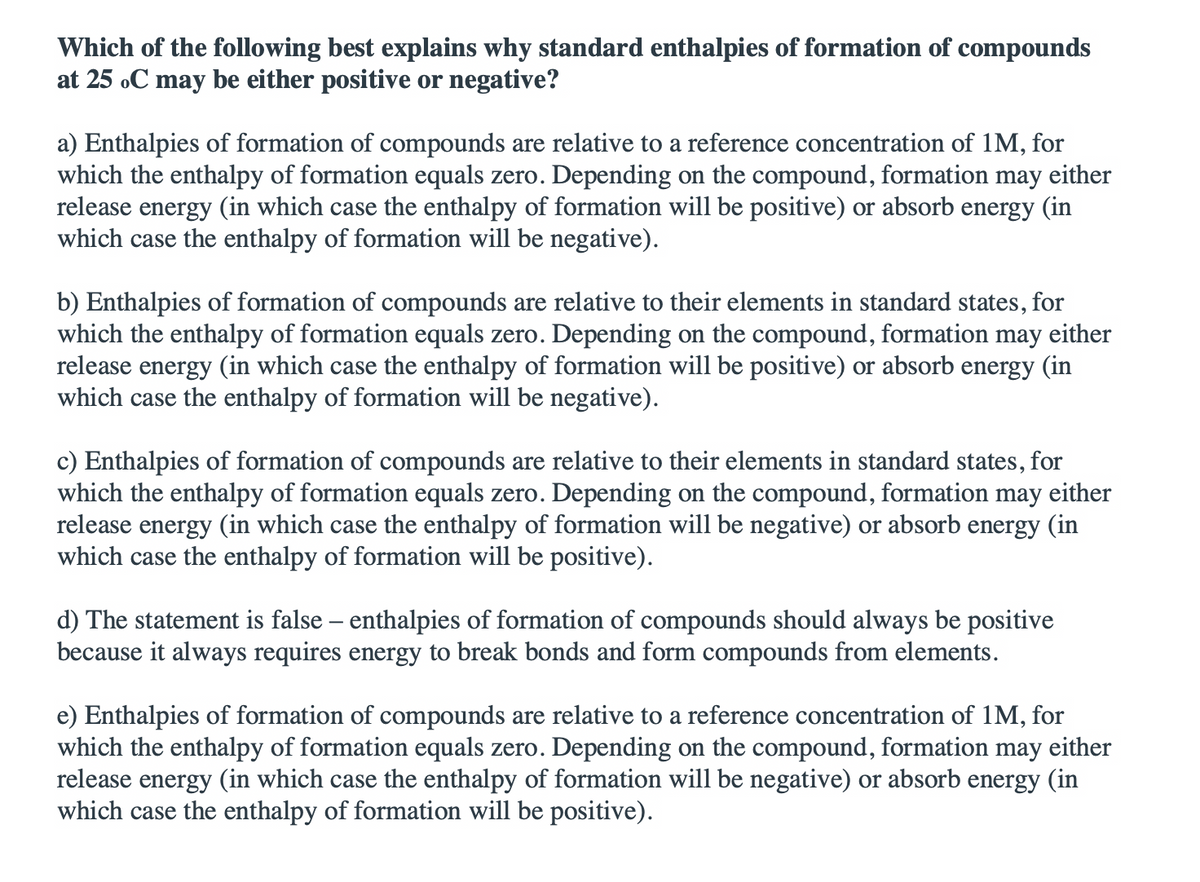Chemistry for Engineering Students
4th Edition
ISBN:9781337398909
Author:Lawrence S. Brown, Tom Holme
Publisher:Lawrence S. Brown, Tom Holme
Chapter9: Energy And Chemistry
Section: Chapter Questions
Problem 9.101PAE
Related questions
Question

Transcribed Image Text:Which of the following best explains why standard enthalpies of formation of compounds
at 25 oC may be either positive or negative?
a) Enthalpies of formation of compounds are relative to a reference concentration of 1M, for
which the enthalpy of formation equals zero. Depending on the compound, formation may either
release energy (in which case the enthalpy of formation will be positive) or absorb energy (in
which case the enthalpy of formation will be negative).
b) Enthalpies of formation of compounds are relative to their elements in standard states, for
which the enthalpy of formation equals zero. Depending on the compound, formation may either
release energy (in which case the enthalpy of formation will be positive) or absorb energy (in
which case the enthalpy of formation will be negative).
c) Enthalpies of formation of compounds are relative to their elements in standard states, for
which the enthalpy of formation equals zero. Depending on the compound, formation may either
release energy (in which case the enthalpy of formation will be negative) or absorb energy (in
which case the enthalpy of formation will be positive).
d) The statement is false – enthalpies of formation of compounds should always be positive
because it always requires energy to break bonds and form compounds from elements.
e) Enthalpies of formation of compounds are relative to a reference concentration of 1M, for
which the enthalpy of formation equals zero.
release energy (in which case the enthalpy of formation will be negative) or absorb energy (in
which case the enthalpy of formation will be positive).
Depending on the compound, formation may either
Expert Solution
This question has been solved!
Explore an expertly crafted, step-by-step solution for a thorough understanding of key concepts.
This is a popular solution!
Trending now
This is a popular solution!
Step by step
Solved in 3 steps

Knowledge Booster
Learn more about
Need a deep-dive on the concept behind this application? Look no further. Learn more about this topic, chemistry and related others by exploring similar questions and additional content below.Recommended textbooks for you

Chemistry for Engineering Students
Chemistry
ISBN:
9781337398909
Author:
Lawrence S. Brown, Tom Holme
Publisher:
Cengage Learning

Chemistry for Engineering Students
Chemistry
ISBN:
9781285199023
Author:
Lawrence S. Brown, Tom Holme
Publisher:
Cengage Learning

Chemistry & Chemical Reactivity
Chemistry
ISBN:
9781133949640
Author:
John C. Kotz, Paul M. Treichel, John Townsend, David Treichel
Publisher:
Cengage Learning

Chemistry for Engineering Students
Chemistry
ISBN:
9781337398909
Author:
Lawrence S. Brown, Tom Holme
Publisher:
Cengage Learning

Chemistry for Engineering Students
Chemistry
ISBN:
9781285199023
Author:
Lawrence S. Brown, Tom Holme
Publisher:
Cengage Learning

Chemistry & Chemical Reactivity
Chemistry
ISBN:
9781133949640
Author:
John C. Kotz, Paul M. Treichel, John Townsend, David Treichel
Publisher:
Cengage Learning

Chemistry & Chemical Reactivity
Chemistry
ISBN:
9781337399074
Author:
John C. Kotz, Paul M. Treichel, John Townsend, David Treichel
Publisher:
Cengage Learning

Chemistry: Principles and Practice
Chemistry
ISBN:
9780534420123
Author:
Daniel L. Reger, Scott R. Goode, David W. Ball, Edward Mercer
Publisher:
Cengage Learning

General Chemistry - Standalone book (MindTap Cour…
Chemistry
ISBN:
9781305580343
Author:
Steven D. Gammon, Ebbing, Darrell Ebbing, Steven D., Darrell; Gammon, Darrell Ebbing; Steven D. Gammon, Darrell D.; Gammon, Ebbing; Steven D. Gammon; Darrell
Publisher:
Cengage Learning